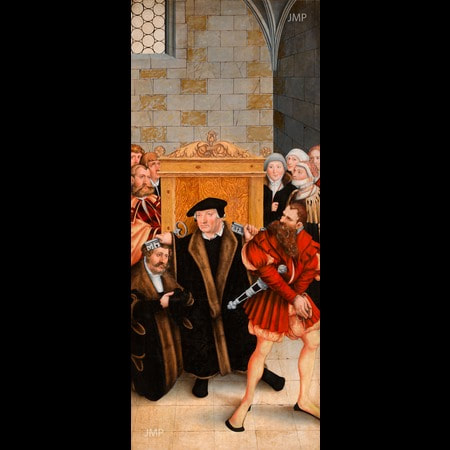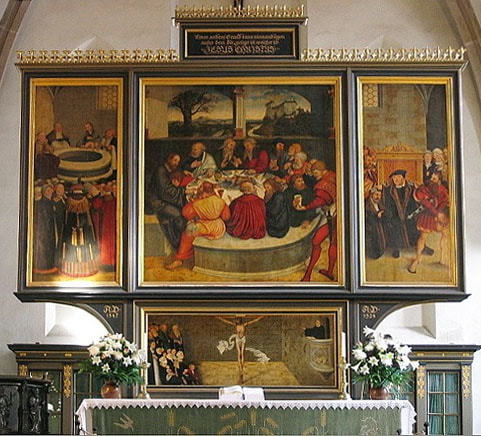Psalm 32
Matthew 16:13-19
John 20:19-23
March 17, 2021
What is the Office of the Keys? The Office of the Keys is that special authority which Christ has given to His Church on earth to forgive the sins of repentant sinners, but to withhold forgiveness from the unrepentant as long as they do not repent.
The Office of the Keys is the fourth means by which God delivers the Gospel into our hearts, so that we may be saved through faith. The term Office or Power of the Keys comes from Jesus’ words in Matthew chapter 16, “I will give you the keys of the kingdom of heaven, whatever you bind on earth will be bound in heaven and whatever you loose on earth will be loosed in heaven.” Jesus is speaking here of the forgiveness of sins. When your sins are loosed from you, you are free to go to paradise. When your sins are bound to you, you are condemned to hell. The power to forgive sins here on earth is the power to open the gates of heaven.
This is marvelous power, which Christ has given to his Church on earth. These keys are more powerful and precious than any on earth. A teenager longs for his dad to hand him the keys to the car, so that he can have some additional freedom. A young man signs a contract with a bank promising to pay back money it will take him years to earn, so that he can hold the keys to his own house. Keys open locks. Locks are placed to protect precious things; to keep those who have no right to access them out. There is nothing more precious than the kingdom of heaven. There is no place more desirable to be than in Christ’s kingdom as a lawful citizen. This means the Office of the Keys is the most powerful and desirable key to possess, which makes the Christian Church and every Christian especially blessed.
The Office of the keys is the authority to forgive the sins of repentant sinner and to withhold forgiveness from the unrepentant as long as they do not repent. This is the fundamental teaching of the Gospel. The Gospel offers free forgiveness of sins for Christ’s sake to all who believe. You must have faith in order to receive the forgiveness of sins. To have faith means you must be a repentant sinner, that is, you must be sorry for your sins. This is because faith does not simply mean to believe, as in, to have mere knowledge. To have faith means to trust. Who trusts in forgiveness, who is not sorry for his sins? It is impossible to have true faith if you do not regret and hate your sin. Unrepentant sinners are sinners who are not sorry for their sin. They do not want to do better. They don’t want to be rescued from their sins. It is impossible for an unrepentant sinner to have saving faith. This is why the Church refuses forgiveness to those who are publicly unrepentant.
The Office of the Keys is put into practice through Confession and Absolution. What is Confession? Confession has two parts. First, that we confess our sins, and second, that we receive absolution, that is, forgiveness, from the pastor as from God Himself, not doubting, but firmly believing that by it our sins are forgiven before God in heaven.
Now, it is certainly true that every Christian has the right and power to confess his sins directly to God and to believe in the forgiveness of sins God promises in Holy Scripture. Every time you pray in the Lord’s Prayer, “Forgive us our trespasses as we forgive those who trespass against us,” you are confessing your sins to God your heavenly Father and you must believe that he forgives you for Christ’s sake from his heavenly throne, or you dare not say, “Amen.” Earlier we prayed Psalm 32, in which we declared, “I said, ‘I will confess my transgressions unto the Lord, and you forgave the iniquity of my sin.” That Psalm of David is your personal prayer to God. And Psalm 32 is not the only penitential Psalm. Psalm 6, 38, 51, 102, 130, and 143 are all penitential Psalms written for sinners to pray to God and ask for forgiveness. Every Christian has the right to use these Psalms as his personal prayer to God and the right to believe that God hears these prayers, accepts them, and forgives. And there are many other Psalms and prayers in Scripture written for your use in prayer. My favorite is Psalm 25. You always have the right to pray to God for forgiveness and believe that God opens the gates of heaven to you.
Yet, the Office of the Keys is exercised when a Christian confesses his sins to God’s minister. Now, if you can pray to God and receive forgiveness of sins, why confess your sins to some man? Because of Christ’s promise of forgiveness. It is the same reason we go to hear the preaching of the Gospel and to receive the Sacrament, so that we can hear and believe the promise. Faith comes from hearing the words of Christ. When the minister declares that your sins are forgiven, then you know that Christ is speaking to you. This forgiveness is as certain even in heaven as it is spoken here on earth.
Confession and Absolution is not supposed to be torture for the souls. You are not required to enumerate your sins, as the Psalm says, “Who can discern his errors; declare me innocent from hidden faults.” (Psalm 19:12). In fact, you do not need to list any of your particular sins. This is what we do in the public confession and absolution at the beginning of the Divine Service. None of us confesses any particular sin, but simply that we are all poor miserable sinners, who have sinned against God. We should examine ourselves at that time, so that we can know that the sins that we feel in our hearts are forgiven. But the absolution you hear from the pastor forgives all your sins, even if you have not spoken them out loud to the pastor.
Yet, in our Catechism we learn, “Before God we should plead guilty of all sins, even those we are not aware of, as we do in the Lord’s Prayer; but before the pastor we should confess only those sins which we know and feel in our hearts.” It is a known fact that confessing a particular sin that bothers you gives relief to the soul. This is why the Psalmist said, “When I kept silent, my bones wasted away through my groaning all day long.” One common exercise at Christian retreats is to have everyone write down a sin that is bothering him on a sheet of paper. Then they take all the sheets of paper and burn them in fire to illustrate that all their sins are forgiven in Christ. It’s a neat illustration, I suppose. Some find it very comforting. But Christ Jesus has already instituted a Means of Grace with his certain promise that whatever sins are forgiven by his minister are forgiven before him in heaven! That is why people go to private absolution, to have peace in their souls and to know that even that sin, that sin that eats at my conscience like acid in a copper cup, that sin has been removed as far away from me as the east is from the west.
Private absolution has fallen into disuse by most Lutherans, but it has never been abolished. It is still a good thing to practice, especially if you have a sin which nags at your conscience or makes you afraid. And you can be confident that your pastor will never make known a sin you confess to him! The promise joined to the words of the minister, “In the stead and by the command of my Lord Jesus Christ, I forgive you...” is as certain as the promise joined to your Baptism, the promise joined to the Sacrament of the Altar, the promise in “whoever believes in him will not perish, but have everlasting life.” This is a promise that will stand against the gates of hell and will indeed open the gates to the kingdom of heaven to all who believe it. Amen.
Midweek Lenten Series: The Means of Grace
“We will now return to the Gospel, which not merely in one way gives us counsel and aid against sin; for God is superabundantly rich [and liberal] in His grace [and goodness]. First, through the spoken Word by which the forgiveness of sins is preached [He commands to be preached] in the whole world; which is the peculiar office of the Gospel. Secondly, through Baptism. Thirdly, through the holy Sacrament of the Altar. Fourthly, through the power of the keys, and also through the mutual conversation and consolation of brethren, Matt. 18:20: Where two or three are gathered together, etc.”
The article above is from the Smalcald Articles, written by Martin Luther at the request of Elector John Frederick in December of 1536 and presented at the meeting of the Smalcaldic League in February of 1537. The Smalcald Articles are part of our Lutheran Confessions in the Book of Concord. In this particular article Luther explains that the one Gospel is given to us in multiple ways. These multiple ways are called the Means of Grace. They are means by which God gives us his grace. So, there is one Gospel, which reveals God’s grace to us in Jesus Christ. Yet, there are many means by which God gives us this Gospel. And no matter by which means the Gospel is given, it is received through faith alone. This Midweek Lenten Series, we will explore how rich and liberal our God is in his grace by examining the Means of Grace.


 RSS Feed
RSS Feed